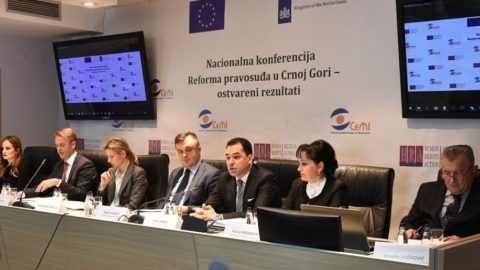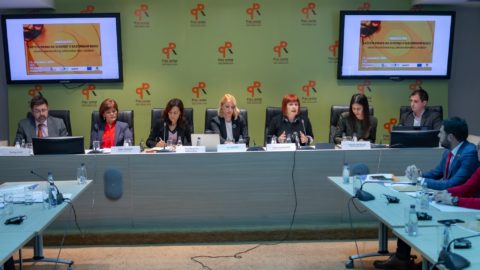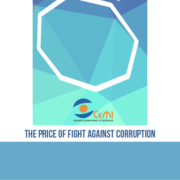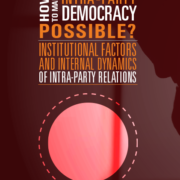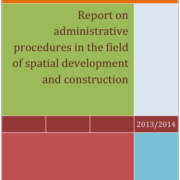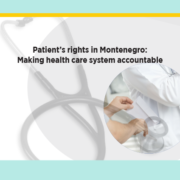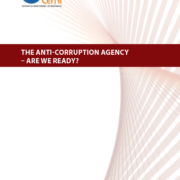
In last nine years, In Montenegro, disputes worth around 55 million euros have been resolved through mediation, and the state should put more effort to promote that legal institution in the period to come, it was announced at the presentation of the Human Rights Action report (HRA).
That NGO, in cooperation with the Centre for Monitoring and Research (CeMI), organized today a round table on the occasion of presenting the report, “How to improve mediation in Montenegro?”.
The Executive Director of HRA, Tea Gorjanc Prelevic, said that mediation in disputes in which parties in Montenegro agreed on the legal institution, has been successfully concluded in 74 percent of cases.
“Last year and the year before, that ratio was 82 and 84 percent. In criminal proceeding, the percentage was even higher and it accounted for 95 per cent of success rate. In recent years, as far as the mediation has been actively implemented in Montenegro, in this way 55 million euros worth disputes have been resolved, whereas the value of preserved human relationships has been utterly priceless, “said Gorjanc Prelevic.
According to her, the benefits of mediation are that it is a fast, inexpensive and informal way of resolving disputes, “in which there is no fear of defeat, and there are barely no shortcomings”.
“Mediation in Montenegro, with 560 procedures per year, applies more than in a half of EU Member States. However, it is not even close to sufficient. It is most implemented in family disputes and criminal proceedings against juveniles” , Gorjanc Prelevic said.
She estimated that judges should be urged to direct more regular parties to a meeting with the mediator, in accordance with their duty provided by Article 27 of the Law on Mediation.
“In 2015, judges directed 1.5 percent of civil cases to mediation. That percentage had to be much higher, ” said Gorjanc Prelevic.
She pointed out that the state should put more effort in promoting mediation in various ways, “primarily on its own example”.
“According to the State Audit Institution’s assessment, in the period from 2012 to 2015, 33 million euros has been paid out from the budget of Montenegro for the trial costs in disputes in which the state lost. If these disputes were resolved by mediation, this money could have been much more cost-effectively used in the public interest, “said Gorjanc Prelevic.
Only last year, as she said, mediation was not attempted in any case in which the party was the state.
“Therefore, we propose that the Government obligates itself to accept mediation in all disputes in which the national authorities are parties in dispute, all with a view to responsibly try to save money from the budget,” said Gorjanc Prelevic.
She pointed out that the stipulated reimbursement for mediators is extremely low and it doesn’t instigate professional engagement in this profession, and that it needs to be changed.
Head of the Directorate for Civil Legislation in the Ministry of Justice, Marina Miranović, said that although a good normative framework has been set, the judicial authorities in practice don’t implement mediation at the proper level.
“The public is not very well familiar with the mediation, which is why it is necessary to animate it. The cooperation among NGOs, lawyers, judicial bodies is required. It is also necessary to instruct judges and public prosecutors to direct parties to the mediation, ” Miranović stated.
She considers it is necessary to actively employ commercial mediation, as well as to stimulate the judges who have the highest number of cases through mediation.
Miranović assessed that in the period to come emphasis should be placed on the mediation where the state is respondent, “in order to cut enormous costs.”
The member of the Judicial Council of Montenegro, Vesna Simovic Zvicer, considers it is needed to take three types of measures in order to improve mediation in Montenegro, out of which the first one relates to, as she said, the conditions for the selection of mediators.
“Experience in a particular field for the selection of mediators should be foreseed. The second measure relates to the measures concerning duties of the mediators and the need to define more thoroughly the duty of mediator when it comes to the violation of the Code of Ethics “, said Simovic Zvicer.
There is a need, as she said, to further encourage those people who would be qualified to participate in the mediation process, through reimbursement.
Director of the Center for Mediation of Montenegro, Marina Lutovac, said that in the coming period, the Centre plans to work, in cooperation with the Ministry of Justice, on developing the Strategy of Development of Mediation.
“It is needed and necessary to examine what is the current situation regarding the implementation of mediation in Montenegro, not only regarding the legislative framework and practice. It is necessary to pave the way for new forms of mediation. We consider that, through the positive resolution of commercial disputes in mediation, it will be contributed to a positive business environment, ” Lutovac said.
She announced that, in the next period, Law on Mediation will be ammended, specifying that rewarding mediators will be stipulated by that Act.
Counsellor at the Embassy of the Kingdom of the Netherlands, Aleksandar Momirov said that the system in the Netherlands is based on negotiations and pragmatic approach to problem solving, thus mediation has logically originated from there. In that country, mediation is not regulated by law, but it doesn’t imply, as he explained, that the institute doesn’t have the state’s support.
In the Netherlands, as he said, about 50 thousand cases are resolved annually through mediation.
“In the Netherlands, the mediator profession is regulated. There is a Federation of Mediators, which number about three thousands. The mediator in the Netherlands determines the costs himself, which are on average about 150 euros per hour. Most common mediation is in civil disputes, “explained Momirov.
He said that in that country as well, they just now are trying to regulate mediation legally.
The round table was held within the project “Towards Efficient Judiciary – Enhancing Development of Legal Professions Related to Judiciary in Montenegro”, supported by the Kingdom of the Netherlands.


 Montenegrin
Montenegrin